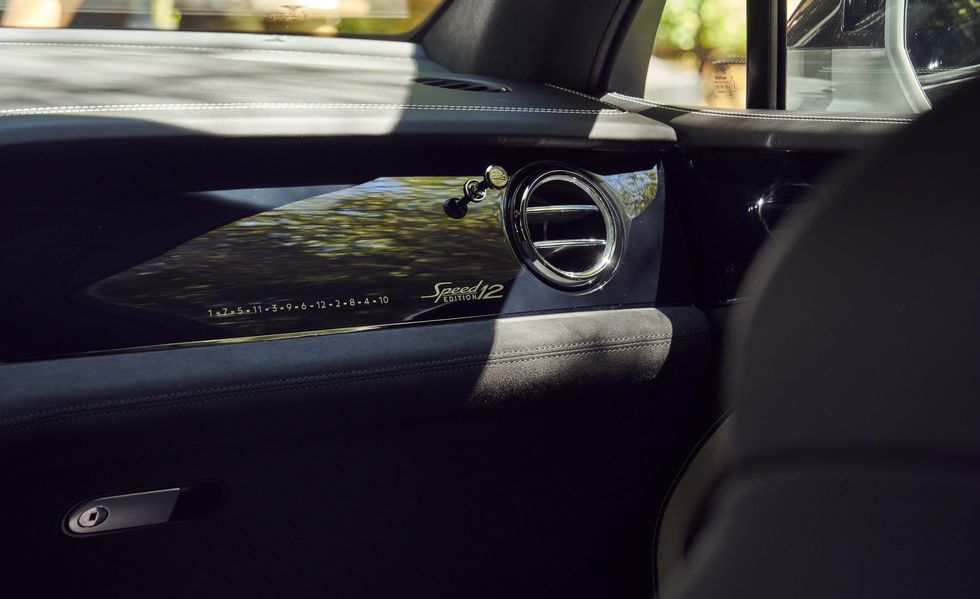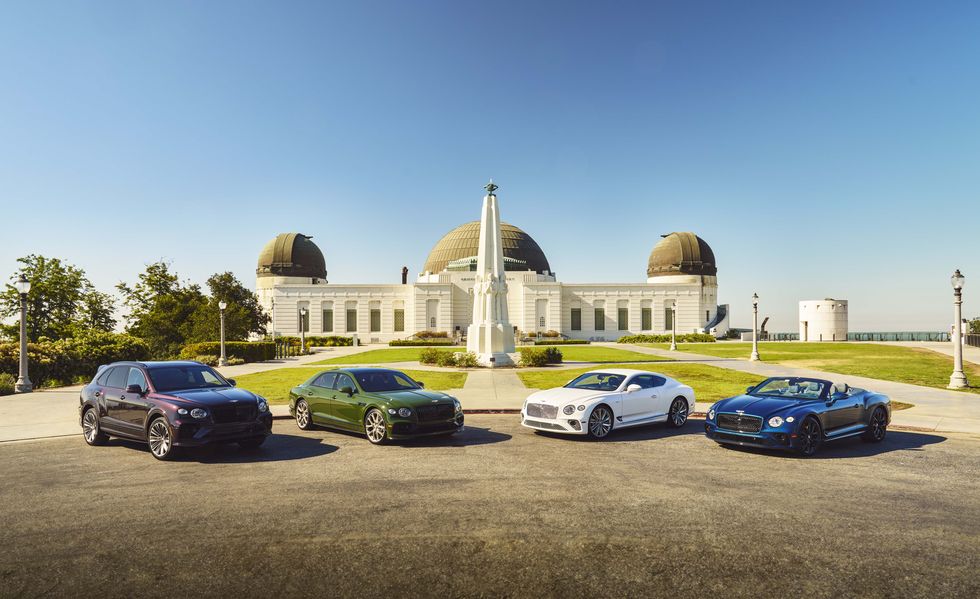Slipping through the dappled shade of a skinny, twisty mountain road, I tried to describe the structure of a W-12 engine to my passengers. “It’s like a V-12, but crinkled up,” I attempted after the technically accurate but visually unhelpful, “It’s like two VW VR6 engines joined together.” Finally, I went with: “Imagine putting two loose six-packs of soda away in the fridge. If you line them up straight, they don’t fit on the shelf, but if you stagger them slightly, you can squeeze them all in.”
I imagine most Bentley passengers don’t care that much about the construction of the W-12, only that its smooth performance and elite reputation carry them unruffled to their destination, but Robert and Suzanne Williams aren’t your average back-seat luxury riders. Both in their 80s, they remain as curious and technically minded as when they first met in art school back in the 1960s. Which means they quizzed me mercilessly on the specs of the Bentley Flying Spur Speed on the way up the mountain.
After stumbling through the explanation for the 6.0-liter W-12 with its dual overhead cams, 626 horses, and 664 pound-feet of torque, attention turned to the various features and controls in the spacious back seat. Suzanne was delighted by the split climate controls—she’s always too hot, he’s always too cold—and Bob enjoyed creating mystery by raising the side window privacy screens and reclining his seat to its full extension. Both were happy to discover the little secret compartment behind the center console, which I had filled with snacks, but they were disappointed that it wasn’t air-conditioned like in a Rolls-Royce.
Not that either has spent that much time in a modern Rolls. The Williamses are successful artists who, at this point in their lives, could probably have the luxury car of their choice, but they started as rebels and maintain a certain punk-rock aesthetic to this day, which is exactly why I thought they might enjoy a day in the back of the Flying Spur. Introducing some famous Ws to each other, so to speak.
Comic-book fans may recognize Bob’s name from the scandalous Guns N’ Roses “Appetite for Destruction” cover, or his work in the ’70s with Zap Comix—which also published R. Crumb. Before that, both Bob and Suzanne worked for Ed “Big Daddy” Roth, drawing monsters in muscle cars and laying out catalogs and magazines for custom-car fanatics. Art and cars have vied for top position in their lives as their underground scene of rat rods and cartoons became mainstream in the highbrow world of fine art. In the ’90s the Williamses founded Juxtapoz magazine, which began as a pushback against the art publications that often ignored any work that didn’t fit within the strict lines of the latest collector trends.
Leaving the W-12 Behind
The W-12 is on a bit of a farewell tour. Bentley announced the end of 12-cylinder production in February 2023, and the last multipot motor is set to roll off the line in April 2024. Bentley introduced the W-12 in the 2003 Continental GT, and while the power and torque have gone up and the emissions have gone down over the past two decades, there’s just no place in Bentley’s electrified plans for a hand-built 12-banger beyond 2024.
The W-12 production line in the Bentley headquarters in Crewe, England, will be transitioned over to the V-8 and hybrid V-6, as will the 30 engine builders who currently work on the W-12. It’s the end of a special powerplant, and Bentley is celebrating it with the Speed Edition 12 trim, available as a limited edition of each of its four Speed models. The Speed Edition cars will feature unique “12” badging, embroidery on the seats, a little “12” etched in the climate control pulls, and the engine firing order on the dash veneer. Just in case you decide to do a quick timing check while out on the road.
While I haven’t had a chance to get behind the wheel of a Speed Edition 12 yet—although I did get to poke at a Bentayga example on display in the signature Opalite Pearl—Bentley did offer a run-through of each of the current W-12 models. The tour route ran from Venice, California, to the Griffith Observatory to Malibu, and if you’re thinking that’s an awful lot of sitting in traffic, you’re right. But if you have to be stuck on an L.A. freeway, best to do it in a Bentley.
From the convertible to the SUV, the W-12 really is a smooth operator, with plenty of grunt to steal a rare open lane and pampering, cooled, and massaging seats for when you’re just sitting there. On the few stretches of open road, I found that, while the Continental has always been a favorite of mine, I was enjoying the Flying Spur even more. Something about how the rear steer makes it corner like a smaller car, but its big footprint intimidates everyone else out of your way. If you’re going to spend $322,595 on a car, this is the sort of experience you should expect. The best moments were in tunnels, when the normally quiet mill plays a timpani solo of bass beats.
Christophe Georges, president and CEO of Bentley Motors Americas, admitted there’s a challenge ahead of the company to forge the same connections with their electric cars that they have with the rumbling big gas engines. “There’s an emotional connection with the engine, the gears. We need to make sure we offer that with an EV when the time comes. There’s a reason we didn’t rush to be first to market.” He says he’s sure the connection can be made, but he understands that people will miss the belly-deep thrill of the W-12.
The Desert Route
Which leads me back to picking up Bob and Suzanne. I wanted more time in the Flying Spur Speed, and they wanted a ride up to Lake Arrowhead. We took the desert route, the Spur coolly eating up miles while the pavement baked outside in 104-degree heat. Up in the hills, the big car tiptoed around the forested corners, occasionally tricked by the area’s off-camber tilts into giving a downshifting cough, but never with enough force to disrupt the conversation.
The neighborhoods around the lake are not for the weak-hearted parker, with roads barely wider than the Flying Spur, but we slid through without a scratch, and the Williamses declared the car most enjoyable. It only really won them over, though, on the way home. “Oh, you need to get over here,” Suzanne instructed, right as a Porsche Cayenne pulled up next to us at the light. When it turned, I put the pedal down, and we surged ahead in the roar of a dozen cylinders. We made our turn, and a few blocks later, the Porsche passed us in a sulk and then pulled into a driveway a few doors down from Bob and Suzanne. I apologized for racing their neighbor, but they were delighted to have shown him who was boss on their street. You can take the drag-racing rebels out in a Bentley, but you can’t take the drag-racing rebel out of a Bentley. Anyhow, the W in W-12 clearly stands for “Win.”
If you’d like to refresh your art school knowledge and learn more about Robert Williams, watch the documentary “Robert Williams Mr Bitchin'” about his life and work.

Senior Editor, Features
Like a sleeper agent activated late in the game, Elana Scherr didn’t know her calling at a young age. Like many girls, she planned to be a vet-astronaut-artist, and came closest to that last one by attending UCLA art school. She painted images of cars, but did not own one. Elana reluctantly got a driver’s license at age 21 and discovered that she not only loved cars and wanted to drive them, but that other people loved cars and wanted to read about them, which meant somebody had to write about them. Since receiving activation codes, Elana has written for numerous car magazines and websites, covering classics, car culture, technology, motorsports, and new-car reviews.



